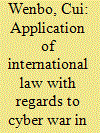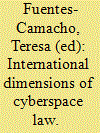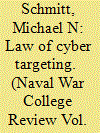| Srl | Item |
| 1 |
ID:
161180


|
|
|
| 2 |
ID:
090493


|
|
|
| 3 |
ID:
046561


|
|
|
|
|
| Publication |
Aldershot, Ashgate Publishing Limited, 2000.
|
| Description |
xviii, 241p.
|
| Series |
Law of cyberspace series
|
| Standard Number |
0754621464
|
|
|
|
|
|
|
|
|
|
|
|
Copies: C:1/I:0,R:0,Q:0
Circulation
| Accession# | Call# | Current Location | Status | Policy | Location |
| 045484 | 341.7577/INT 045484 | Main | On Shelf | General | |
|
|
|
|
| 4 |
ID:
138703


|
|
|
|
|
| Summary/Abstract |
The 2008 war between Georgia and Russia was predictably short, as Russian military might quickly trumped Georgian nationalist enthusiasm. Beyond its momentous geopolitical implications, it was the first war in which cyber activities loomed large; the conflict marked the public birth of “cyber war,” or at least cyber in war.
|
|
|
|
|
|
|
|
|
|
|
|
|
|
|
|
| 5 |
ID:
130047


|
|
|
|
|
| Publication |
2014.
|
| Summary/Abstract |
This article analyzes the main motivations behind manned interstellar exploration. There is a wide range of justifications for manned interstellar exploration. Some observers contend that the main reasons are the survival of the human species and the spreading of life in the universe. I argue that the survival of the human species is a very long-term threat and, as such, it is not the main driver for interstellar exploration within a reasonable time horizon. The discovery of habitable planets within 5 to 15 light years from Earth and the possibility that Earth will no longer define the limit of growth constitute stronger motivations. I argue that manned interstellar exploration will be achieved through the mobilization of both public and private resources, as in the past opening of new frontiers, with governments providing initial support in exploration and science, in advancing critical technologies, and in building space infrastructure. The private sector would then take the lead in creating new markets and in expanding humanity's presence in space.
|
|
|
|
|
|
|
|
|
|
|
|
|
|
|
|